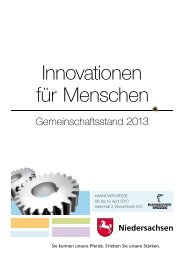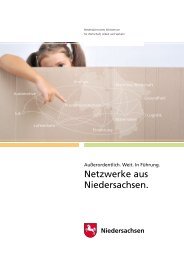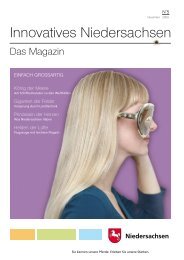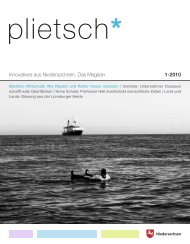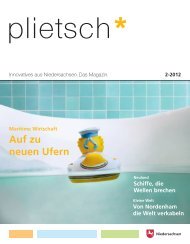magazine for business and investment - Innovatives Niedersachsen
magazine for business and investment - Innovatives Niedersachsen
magazine for business and investment - Innovatives Niedersachsen
Create successful ePaper yourself
Turn your PDF publications into a flip-book with our unique Google optimized e-Paper software.
Image: Dow<br />
“A key success factor<br />
<strong>for</strong> the chemicals industry<br />
in <strong>Niedersachsen</strong><br />
is its central role in an<br />
integrated value chain.”<br />
Renate Klingenberg, Deputy Managing Director VCI Nord<br />
<strong>and</strong> Managing Director of ChemCoast e.V.<br />
At the Bomlitz site in the Industrial Park Walsrode, Dow<br />
Wolff Cellulosics manufactures products which make<br />
everyday life easier from the renewable, natural raw<br />
material of cellulose.<br />
covers an area of about 500 hectares making it one of the<br />
biggest industrial parks in Germany. Lingen has established<br />
itself as a training location with the university, the professional<br />
academy, the vocational training schools <strong>and</strong> the fulltime<br />
vocational chemical college.”<br />
Ineos is one of the largest worldwide chemical companies<br />
with 60 production sites <strong>and</strong> 15,000 employees across<br />
13 countries. The chemicals industry in Wilhelmshaven<br />
specialises in PVC production. Ineos ChlorVinyls is Europe’s<br />
leading PVC manufacturer, one of the largest chlorine<br />
manufacturers in Europe <strong>and</strong> a worldwide leader in chlorine<br />
derivatives. In Wilhelmshaven it operates the two production<br />
sites in Voslapp <strong>and</strong> in Rüstersiel. Dr. Peter Prinz, Managing<br />
Director of Ineos ChlorVinyls explains, “Our inventory includes<br />
a chlorine plant with a production capacity of 137,000<br />
tonnes of chlorine <strong>and</strong> 300,000 tonnes of sodium hydroxide<br />
per year, a VCM plant with a production capacity of<br />
400,000 tonnes, a PVC plant with an annual capacity of<br />
380,000 tonnes, supply systems <strong>for</strong> the provision of energy<br />
<strong>and</strong> operating resources as well as a harbour dock <strong>for</strong><br />
the import <strong>and</strong> export of raw materials, intermediate <strong>and</strong><br />
finished products.”<br />
In Wilhelmshaven are also located the most important<br />
<strong>and</strong> biggest crude oil import facilities of Germany. The<br />
hub <strong>for</strong> h<strong>and</strong>ling, storage <strong>and</strong> transportation of crude oil<br />
is Nord-West Oelleitung GmbH (NWO). In 2011 about 17.5<br />
million tonnes of oil were h<strong>and</strong>led by NWO <strong>and</strong> transported<br />
by pipeline to the connected refineries in the Emsl<strong>and</strong> (Lingen)<br />
<strong>and</strong> to refineries in the Rhine- <strong>and</strong> Ruhr-Region as well as to<br />
the refinery in Hamburg. Crude oil <strong>and</strong> its further processing<br />
in refineries supplies the chemicals industry with the most<br />
important raw materials. The total crude volume h<strong>and</strong>led by<br />
NWO makes up approximately one fifth of all German crude<br />
oil imports. The provenience of most of the oil is Russia (7.5<br />
million tonnes), however countries like the United Kingdom,<br />
Norway <strong>and</strong> Nigeria are also important suppliers. Other comparable<br />
plants <strong>and</strong> facilities in Europe are located in Trieste,<br />
Rotterdam <strong>and</strong> Marseilles. According to Dr.-Ing Jörg Niegsch,<br />
managing director of NWO, “This excellent location is very<br />
beneficial <strong>and</strong> convenient <strong>for</strong> marine transportation. The ability<br />
<strong>for</strong> ships to dock even with a draught of 18 metres makes<br />
Wilhelmshaven a first-class <strong>and</strong> unique location. The Jade-<br />
Weser-Port will additionally offer new opportunities to interconnect<br />
the coastal area as a region <strong>for</strong> chemical industry.<br />
Through these modern ports the location of <strong>Niedersachsen</strong><br />
can offer an excellent gateway <strong>for</strong> connections to the international<br />
seaway network. In conjunction with the advantage<br />
of location there is considerable potential <strong>for</strong> growth of the<br />
German chemicals industry. With “Chem Coast e.V.” a skilled<br />
contact partner is available in <strong>Niedersachsen</strong>. In a nutshell:<br />
The chemicals industry is well-placed in the North!”<br />
CoastSite is responsible <strong>for</strong> the promotion, marketing<br />
<strong>and</strong> development of the location of Wilhelmshaven <strong>for</strong><br />
chemicals <strong>and</strong> technology companies. According to Andreas<br />
Leonhardt, Chairman of CoastSite Wilhelmshaven e.V.,<br />
“Wilhelmshaven is an energy nerve centre, a site <strong>for</strong> cutting-edge<br />
chemicals <strong>and</strong> maritime technologies. The chemicals<br />
location of Wilhelmshaven sees the container terminal<br />
<strong>and</strong> the goods transportation centre in the Jade-Weser-<br />
Port <strong>and</strong> its geographic <strong>and</strong> logistical benefits as an outst<strong>and</strong>ing<br />
opportunity to consolidate the coastal area as a<br />
chemicals region.”<br />
With international groups such as Dow, Honeywell <strong>and</strong><br />
Ineos, the new Jade-Weser-Port deep water harbour <strong>and</strong> an<br />
outst<strong>and</strong>ing infrastructure, the chemical location of <strong>Niedersachsen</strong><br />
is in a very good international position. Gerrit Lieske,<br />
Head of the Industrial Park Walsrode is looking to the future,<br />
“Sustainability, protecting resources <strong>and</strong> customised solutions<br />
focused on the needs of people will <strong>for</strong>m the foundations of<br />
our activities over the next few years. The industry must not<br />
only convey to people that chemical products are essential<br />
parts of our lives but also that through our research <strong>and</strong> our<br />
solutions the chemical industry makes a considerable contribution<br />
to overcoming challenges such as global warming,<br />
nutrition or mobility.”<br />





